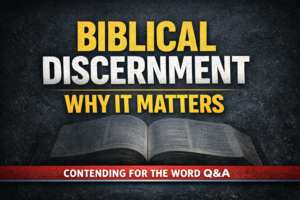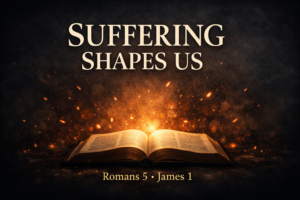⏱️ Estimated Reading Time: 5 min read
To speak of the sanctity of the Sabbath is to speak about our dependence upon God. Rest is a major theological theme across the canon. Yet it always directs man, not simply to relaxation, but to utter surrender to his need of God. As such, there is something about the principle of the Fourth Commandment that remains binding on the believer today. Believers today should keep the Sabbath in principle, but not in detail.
In the Old Testament the obligation of Sabbath rest has two foundational grounds: creation and redemption. Here in Exodus 20 it is grounded in God’s activity of resting after the work of Creation. So, Moses states:
Exodus 20:9, “Six days you shall labor and do all your work, but the seventh day is a sabbath to the Lord your God. On it you shall not do any work, neither you, nor your son or daughter, nor your male or female servant, nor your animals, nor any foreigner residing in your towns.”
And this command is then grounded in God’s resting:
Exodus 20:11, “For in six days the Lord made the heavens and the earth, the sea, and all that is in them, but he rested on the seventh day. Therefore the Lord blessed the Sabbath day and made it holy.”
God’s resting established the holiness of the seventh day and our “imaging” Him requires that we follow suit. Yet this is not the only foundation for “keeping the Sabbath.”
In Deuteronomy the ground for the fourth commandment is shifted from creation to redemption. Moses writes:
Remember that you were slaves in Egypt and that the Lord your God brought you out of there with a mighty hand and an outstretched arm. Therefore the Lord your God has commanded you to observe the Sabbath day. (Deut. 5:15)
The shift does not discount what we read here in Exodus (see verse 12, “as the Lord has commanded you,” referring back to Exodus), but it does expand the concept. Dependence upon God is the corresponding principle. In both cases the Israelites are to take the seventh day and remember their need of God. It is in relation to this principle that we can see its abiding value for even believers today.
There has been no small amount of debate regarding the place of the Sabbath in the New Covenant. Views on the binding nature of the fourth commandment have ranged from very loose to very strict, with a range of moderate views in between. When we consider the place of this commandment in the New Testament we find it notably missing from Jesus’ teaching. In the Sermon on the Mount He mentions all of the rest of these Ten Commandments, but does not repeat the fourth. Yet, we find that the keeping of the Sabbath is not entirely absent from Jesus life and ministry. A quick exploration of this will help us to see its abiding, if modified, role even in our lives today.
Mark 2 is a good starting place. Here Jesus states plainly that “The Sabbath was made for man” (Mark 2:27a). For Jesus, the Sabbath finds its origin in creation, not merely in the Mosaic law. The language harkens us back to Genesis 1. The Sabbath is established at creation and is designed for the needs of man. In other words it is a creation ordinance and is not contingent upon the exact transference of the Old Covenant. Yet, Jesus also emphasizes that He is “Lord of the Sabbath.” As Lord of the Sabbath Jesus commends, in the parallel account to Mark, both the disciples’ plucking and eating of grain (Matt. 12:1-8), and His own healing Matthew 12:9-14). Things which had been believed to be contrary to “keeping the Sabbath.” In commending such things, Jesus is demonstrating that He is doing something new. In fact in the Mark account, just prior to His declaration of being Lord of the Sabbath, Jesus makes this point. In Mark 2:21-22 we read:
21 “No one sews a patch of unshrunk cloth on an old garment. Otherwise, the new piece will pull away from the old, making the tear worse. 22 And no one pours new wine into old wineskins. Otherwise, the wine will burst the skins, and both the wine and the wineskins will be ruined. No, they pour new wine into new wineskins.”
The emphasis is on the new covenant work of Jesus. As Lord of the Sabbath He will carry over the principle of man’s dependence upon God, but He will change the shape of what the Fourth Commandment looks like (note also Paul’s discussion of the shift in important days of the week, see Rom. 14:5; Gal. 4:9-11; and Col. 2:16-17).
There “remains a Sabbath rest for the people of God” (Heb. 4:9), but it looks different in light of the New Covenant. We remember our dependence upon God for all things, not least among them our salvation. We rest from our works of self-righteousness and stand on the finished work of Christ. We do not keep the Sabbath Day as the Israelites did, because that Sabbath pointed to the ultimate Sabbath which is being realized in Christ and will be consummated on the final “Day of the Lord.” Nonetheless there is a principle at work here that we must remember. We keep the Sabbath by remembering our need of God, by taking time to worship with His people, and by submitting to His Spirit. The principle still applies, even while the details do not.




